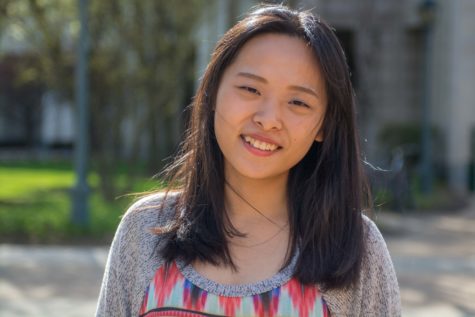Wan: Regaining a reader’s voice
It has been a memorable year working for The Observer news section, even by just counting the sheer amount of deadlines I have met in order to have news for our newspaper every Friday. I feel fortunate that the news section has covered important issues in the past year, from housing police officers last summer to the Women’s March on Cleveland this winter.
As this is my last issue as news editor, I decided to write down two reminders to our readers.
First, the administration does care for its students. They aren’t just always fabricating their next plan to raise the price of tuition. It is not the job of everyone in the university to figure out excuses for the annual three percent increase in tuition. If anything, it is the provost’s, who displays slideshows with dazzling photos of new facilities and oversimplified graphs of the university budget at the tuition forum. Without sounding too much like an apologist, an increase of three percent is common among American higher education institutions. If there is an easier way for the administration to cover the expenditure with revenue other than tuition, I doubt that they would hesitate before taking it.
Unfortunately the university’s investment portfolios seemed to perform poorly last year, with the revenue raised from endowment decreasing by 6.4 percent compared to the 2015-2016 fiscal year. As a history major, I will not venture myself into the world of finance and launch criticism against the endowment payout. After all, the average endowment returns of American universities decreased by 1.9 percent in 2016. Case Western Reserve University is not too far behind.
Despite all this, I do want to stress that if it is as easy to invest in the “right” assets as to convince students that the school needs to charge more, I doubt that the administration would not take it. The administration would obviously strive to improve college experience and lessen students’ financial burden, but there are constraints to this goal. With no other venue available for the school to raise money, students and their families become the last and most stable resort.
On a different note, there is probably no truer principle in news writing than pursuing the truth itself, especially in light of recent political “jargon” of “fake news.” However it is exactly in this noble pursuit that I lost myself and found it increasingly difficult to discover the truth. This is not to say that I would mistake the date of an event or distort what I have witnessed or heard in an interview.
The delicacy of news writing lies in the fact that even a seemingly harmless switch of words could change the entire meaning of an article. Granted, this difficulty has always been in existence, but because of fake news, it poses more challenges than ever. When news can simply be labelled as fake with no other way to assess it’s truth outside of other news outlets, it enables the discreditation of the whole media. I thought hard on this challenge. I attempted to provide more details, interview more people and use more statistics, but I realized that the power to combat “fakeness” does not lie in me.
The best reporters can do is present as many different perspectives as possible while being aware that they cannot be completely unbiased. Instead, they should put forth their best efforts and invest trust in their readers’ judgements.
After all, what is the truth anyway? As a history major, I only see opinions being socially constructed. As a mathematics major, my best response would be those numbers that live in Plato’s happy heaven. As a soon-to-be former news editor, I would like to leave the answer to our readers.

Celia Wan is a sophomore majoring in mathematics and history. She joined The Observer in the fall of 2015 and became the news editor at the end of her...


